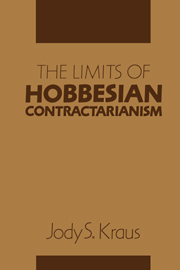2 - Hampton's justificatory strategy
Published online by Cambridge University Press: 05 June 2012
Summary
In Hobbes and the Social Contract Tradition, Jean Hampton first presents Hobbes's well-known argument for the legitimacy of a political sovereign with absolute power and authority. This argument concludes that individuals must completely alienate all of their rights to a sovereign who shall be free to rule as she sees fit. It invites us to understand the fundamental relationship between subject and sovereign as that of slave and master. Hampton argues that the fundamental flaw in this position, or “alienation theory” as she refers to it, is that Hobbes's views on psychology and ethics, both discussed in this chapter, entail an inalienable right to selfdefense, one which would therefore survive the transition from the state of nature to political association. In order to reconcile Hobbes's psychological and ethical theories, which together entail an inalienable right to self-defense, and Hobbes's political theory, which entails the alienation of all rights including the right to self-defense, Hampton jettisons alienation theory and endorses a “fallback” position she reconstructs from previously neglected sections of Hobbes's writings. Unlike alienation theory, this position purports to justify a sovereign with only limited power and authority and invites us to understand the relationship between subject and sovereign as one of principal and agent, rather than slave and master. Hampton's chief objective, then, is to explicate and defend, on Hobbes's behalf, this modified Hobbesian fallback position, or “agency theory,” a position which preserves the fundamental insights of Hobbes's approach, while discarding perhaps his most objectionable and infamous conclusion.
- Type
- Chapter
- Information
- The Limits of Hobbesian Contractarianism , pp. 47 - 103Publisher: Cambridge University PressPrint publication year: 1993



